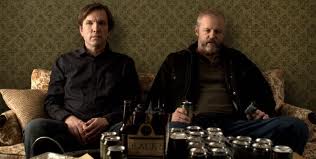The Collaborator

Though The Collaborator is Martin Donovan’s writing and directorial debut, he is no stranger to the game. Donovan has acted in both film and television for over two decades. His roles have ranged from co-staring in the 2009 horror film, A Haunting in Connecticut, to playing Mary-Louise Parker’s love interest in the popular Showtime television series, Weeds. Though Martin had plenty of acting experience in a number of different genres (as well in a T.V. show about a woman who sells pot), The Collaborator marks the first time an audience gets to see what he can do behind the camera. So what’s the verdict? The Collaborator may not be perfect, but thankfully, the guy can write.
The plot seems simple enough, though like most everything else about this film, it is not quite that simple. The Collaborator is a hostage film, yes, but don’t expect any high-energy chase scenes or an abundance of machine guns and sniper rifles. In fact, the film hardly even touches on the danger of the situation. Sure, there’s a gun, some booze and a S.W.A.T. team involved, but by half way through, the viewer is pretty certain that no one’s getting hurt. That’s not what is at play in this film. Instead, The Collaborator is about two men—two middle-aged, failing men—who are stuck in one house.
Martin Donovan stars in his own film as the playwright Robert Longfellow, who is referred to in the preface of the movie as a writer who is “fading into irrelevancy.” The “writer of the film is portraying the writer in the film” dynamic helps undermine the traditional divide between cinematic fact and fiction right off the bat, a great trick, and one Donovan exploits repeatedly throughout the film).
-

-

-

-

-

-

-

-

-

-

-

-

-

-

-

-

-

-

-

-

-

-

-

-

-

-

-

-

-

-

-

-

-

-

-

-

-

-

-

-








































